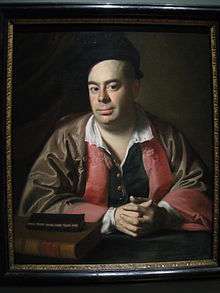Nathaniel Hurd
| Nathaniel Hurd | |
|---|---|
 Portrait of Nathaniel Hurd by John Singleton Copley, ca.1765 (Cleveland Museum of Art) | |
| Born | c. 1729 |
| Died | 1777 |
| Occupation | engraver and silversmith |
Nathaniel Hurd (c. 1729 – 1777) was an engraver and silversmith in Boston, Massachusetts, in the 18th century.[1] He engraved "bookplates ... heraldic devices, seals, ... paper currency, and business cards."[2][3] The lion rampant logo for the prestigious Phillips Exeter Academy is taken from a bookplate Hurd designed for John Phillips in 1775.[4] Examples of Hurd's work are in the collections of Harvard University; Yale University; Historic Deerfield;[5] the Lexington Historical Society; and the Museum of Fine Arts Boston.
References
- ↑ Charles Dexter Allen (1895), American book-plates, a guide to their study, London: George Bell & Sons, OCLC 1472039
- ↑ "Portrait of Nathaniel Hurd by Copley." Bulletin of the Cleveland Museum of Art, Vol. 10, No. 3 (Mar., 1923)
- ↑ American Broadsides and Ephemera, Series 1
- ↑ "The Exeter Lion Rampant". The Academy Archives. Trustees of Phillips Exeter Academy. Retrieved 11 January 2014.
- ↑ "Five Colleges and Historic Deerfield Museum Consortium".
Further reading
- William Dunlap (1834), History of the rise and progress of the arts of design in the United States, New York: George P. Scott and Co., Printers, OCLC 812030
- Hollis French. Jacob Hurd and his sons Nathaniel & Benjamin, silversmiths, 1702–1781. Walpole Society, 1939.
External links
| Wikimedia Commons has media related to Nathaniel Hurd. |
This article is issued from Wikipedia - version of the 10/9/2016. The text is available under the Creative Commons Attribution/Share Alike but additional terms may apply for the media files.